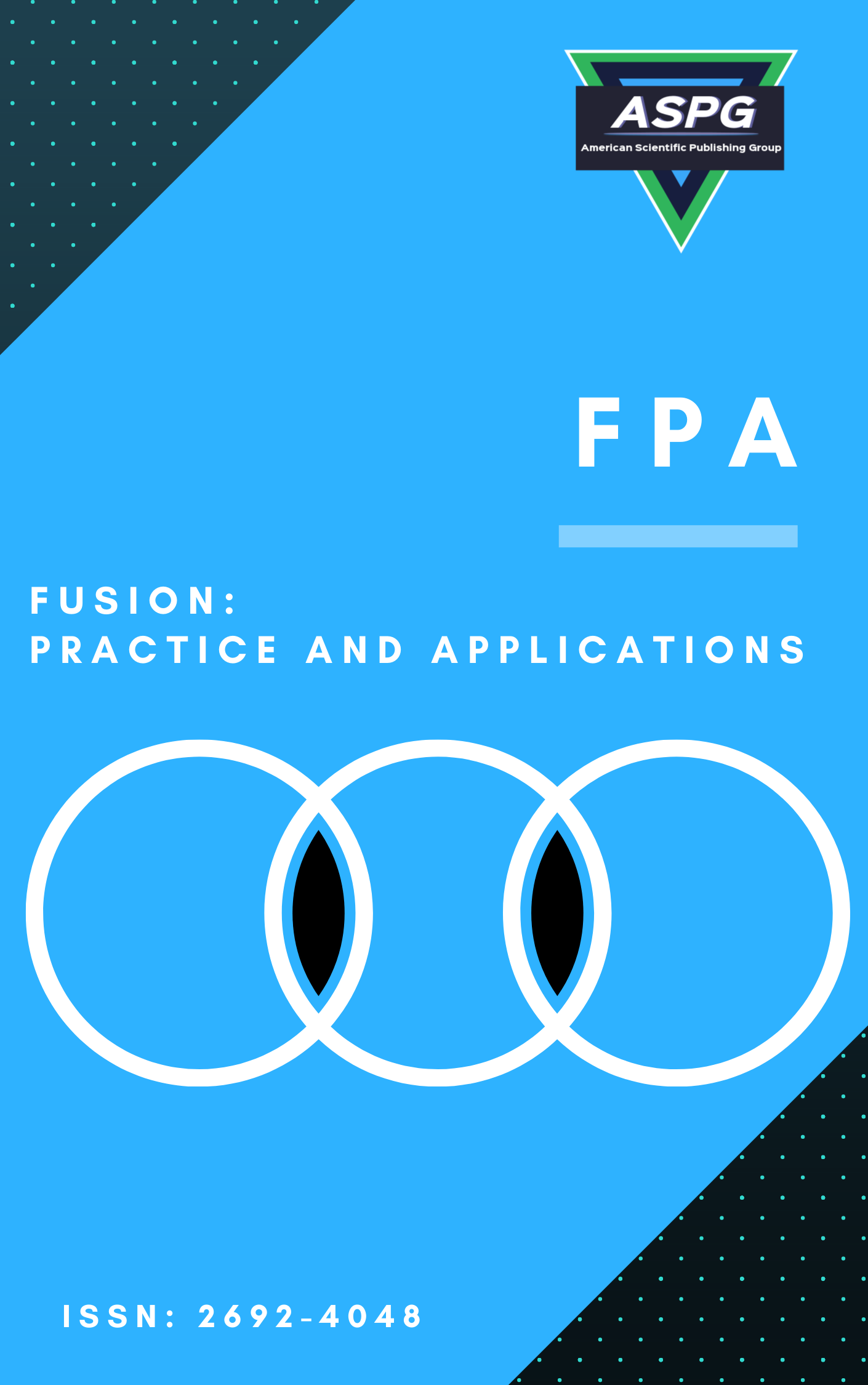

Volume 15 , Issue 1 , PP: 98-119, 2024 | Cite this article as | XML | Html | PDF | Full Length Article
Ahmad Raza Khan 1 * , Abdul Khader Jilani 2
Doi: https://doi.org/10.54216/FPA.150109
The increasing adoption of cloud computing in healthcare presents immense opportunities for disease prediction, while raising critical privacy concerns. This study proposes a novel privacy-preserving scheme that leverages advanced cryptographic techniques, blockchain technology and deep learning approach within a cloud platform, to ensure secure data handling and accurate disease prediction. The proposed methodology encompasses authentication, encryption, blockchain-based transmission, and a deep learning-based heart disease prediction system (HDPS). Through rigorous authentication protocols and two-level security mechanisms, patient data is securely encrypted using RSA and Blowfish encryption before storage in the cloud. Blockchain technology facilitates secure data transmission, ensuring integrity and traceability. At the receiver end, data decryption precedes input into the HDPS, comprising artificial neural networks (ANN), convolutional neural networks (CNN), and recurrent neural networks (RNN). The HDPS incorporates data preprocessing, feature extraction, feature selection, and a deep learning-based prediction model, achieving remarkable accuracy (0.9941) in heart disease prediction. Implemented in MATLAB, this approach offers a robust framework for privacy-preserving heart disease prediction in cloud-based healthcare systems.
Cloud Computing , Privacy-Preserving Scheme , Heart Disease Prediction , Blockchain-Based Transmission , Two-Level Security Mechanism
[1] Yang, H., Luo, Y.M., Ma, C.Y., Zhang, T.Y., Zhou, T., Ren, X.L., He, X.L., Deng, K.J., Yan, D., Tang, H. and Lin, H., 2023. A gender specific risk assessment of coronary heart disease based on physical examination data. NPJ digital medicine, 6(1), p.136.
[2] Ali, M.M., Paul, B.K., Ahmed, K., Bui, F.M., Quinn, J.M. and Moni, M.A., 2021. Heart disease prediction using supervised machine learning algorithms: Performance analysis and comparison. Computers in Biology and Medicine, 136, p.104672.
[3] Shah, D., Patel, S. and Bharti, S.K., 2020. Heart disease prediction using machine learning techniques. SN Computer Science, 1, pp.1-6.
[4] Wagle, A.A., Isakadze, N., Nasir, K. and Martin, S.S., 2021. Strengthening the learning health system in cardiovascular disease prevention: time to leverage big data and digital solutions. Current atherosclerosis reports, 23, pp.1-8.
[5] Tiwari, P., Colborn, K.L., Smith, D.E., Xing, F., Ghosh, D. and Rosenberg, M.A., 2020. Assessment of a machine learning model applied to harmonized electronic health record data for the prediction of incident atrial fibrillation. JAMA network open, 3(1), pp.e1919396-e1919396.
[6] Desai, F., Chowdhury, D., Kaur, R., Peeters, M., Arya, R.C., Wander, G.S., Gill, S.S. and Buyya, R., 2022. HealthCloud: A system for monitoring health status of heart patients using machine learning and cloud computing. Internet of Things, 17, p.100485.
[7] Faridi, F., Sarwar, H., Ahtisham, M. and Jamal, K., 2022. Cloud computing approaches in health care. Materials Today: Proceedings, 51, pp.1217-1223.
[8] Abdelfattah, S., Badr, M.M., Mahmoud, M., Abualsaud, K., Yaacoub, E. and Guizani, M., 2023. Efficient and privacy-preserving cloud-based medical diagnosis using an ensemble classifier with inherent access control and micro-payment. IEEE Internet of Things Journal.
[9] Ren, W., Tong, X., Du, J., Wang, N., Li, S.C., Min, G., Zhao, Z. and Bashir, A.K., 2021. Privacy-preserving using homomorphic encryption in Mobile IoT systems. Computer Communications, 165, pp.105-111.
[10] Ali, A., Al-Rimy, B.A.S., Alsubaei, F.S., Almazroi, A.A. and Almazroi, A.A., 2023. HealthLock: Blockchain-Based Privacy Preservation Using Homomorphic Encryption in Internet of Things Healthcare Applications. Sensors, 23(15), p.6762.
[11] Li, D., Liao, X., Xiang, T., Wu, J. and Le, J., 2020. Privacy-preserving self-serviced medical diagnosis scheme based on secure multi-party computation. Computers & Security, 90, p.101701.
[12] Khan, J.A., 2024. Role-Based access Control (RBAC) and Attribute-Based Access Control (ABAC). In Improving Security, Privacy, and Trust in Cloud Computing (pp. 113-126). IGI Global.
[13] Kanwal, T., Anjum, A. and Khan, A., 2021. Privacy preservation in e-health cloud: taxonomy, privacy requirements, feasibility analysis, and opportunities. Cluster Computing, 24, pp.293-317.
[14] Padinjappurathu Gopalan, S., Chowdhary, C.L., Iwendi, C., Farid, M.A. and Ramasamy, L.K., 2022. An efficient and privacy-preserving scheme for disease prediction in modern healthcare systems. Sensors, 22(15), p.5574.
[15] Jayaram, R. and Prabakaran, S., 2021. Onboard disease prediction and rehabilitation monitoring on secure edge-cloud integrated privacy preserving healthcare system. Egyptian Informatics Journal, 22(4), pp.401-410
[16] Munirathinam, T., Ganapathy, S. and Kannan, A., 2020. Cloud and IoT based privacy preserved e-Healthcare system using secured storage algorithm and deep learning. Journal of Intelligent & Fuzzy Systems, 39(3), pp.3011-3023.
[17] Xu, C., Wang, N., Zhu, L., Zhang, C., Sharif, K. and Wu, H., 2021. Reliable and privacy-preserving top-k disease matching schemes for E-healthcare systems. IEEE Internet of Things Journal, 9(7), pp.5537-5547.
[18] Khan, M.A., Abbas, S., Atta, A., Ditta, A., Alquhayz, H., Khan, M.F. and Naqvi, R.A., 2020. Intelligent Cloud Based Heart Disease Prediction System Empowered with Supervised Machine Learning. Computers, Materials & Continua, 65(1).
[19] Nancy, A.A., Ravindran, D., Raj Vincent, P.D., Srinivasan, K. and Gutierrez Reina, D., 2022. Iot-cloud-based smart healthcare monitoring system for heart disease prediction via deep learning. Electronics, 11(15), p.2292.
[20] Li, D., Liao, X., Xiang, T., Wu, J. and Le, J., 2020. Privacy-preserving self-serviced medical diagnosis scheme based on secure multi-party computation. Computers & Security, 90, p.101701.
[21] Wang, W., Li, X., Qiu, X., Zhang, X., Brusic, V. and Zhao, J., 2023. A privacy preserving framework for federated learning in smart healthcare systems. Information Processing & Management, 60(1), p.103167.
[22] Sharma, S., Chen, K. and Sheth, A., 2018. Toward practical privacy-preserving analytics for IoT and cloud-based healthcare systems. IEEE Internet Computing, 22(2), pp.42-51.
[23] Chenthara, S., Ahmed, K., Wang, H. and Whittaker, F., 2019. Security and privacy-preserving challenges of e-health solutions in cloud computing. IEEE access, 7, pp.74361-74382.